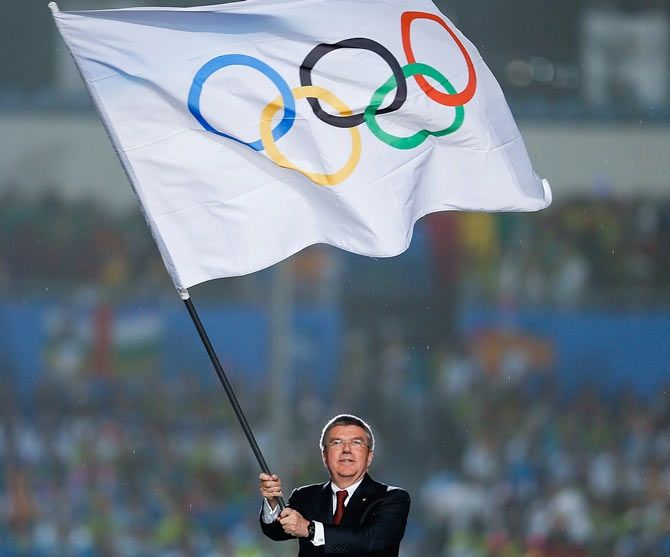
By focusing on the low awareness that Indians have about the Games, the campaign hopes to build an association between the brand and national honour
It was an unusual call to take.
Tata Salt, when it decided to associate with the Indian Olympics Association, instead of creating a routine feel-good cheer the Indian team sort of campaign, went for one that would make people squirm a bit.
It exposed the lack of awareness among most Indians about the Games and spun stories about little-known members of the contingent, Babita Kumari, Shiva Thapa and Inderjeet Singh.
The Namak ke waastey campaign launched last month has been playing on television and digital media and helps convey the fact, the company says, that the brand is more than a commodity that people consume.
It is invested in building a nation and hence in supporting the Indian contingent and building awareness about the journey of its key members.
Sources indicated that Tata Salt has set aside about 8-10 per cent of their marketing budget for the Olympics this year.
It all started with a survey which threw up alarming factoids such as one in three Indians believed that we have a chance at bringing home an Olympic medal in cricket, a sport that is not even part of the Games.
This was perhaps the trigger for the tone of the campaign.
Sagar Boke, head of marketing, consumer product business, Tata Chemicals says, “Sport has always been an integral part of the Tata way of life.
Over the last three decades, Tata Salt has gained the stature of ‘Desh ka Namak’, with the singular aim of ‘giving back to the nation’ and fueling its social growth.”
The message being amplified by the ongoing campaign, the company believes, fits well with its position as the ‘salt of the nation’.
It reinforces the brand’s commitment towards ensuring that the Indian team is never short of support to perform its best.
Vikram Menon, president and country head, Ogilvy One India explains that the campaign began with a need to support the Olympians.
He says, “A massive number of Indians do not support, or even know about the Olympians who represent India on the global platform.
"We all know our popular sport persons’ names and their backgrounds, but how many of us really know our Olympians names, their sports, backgrounds, their challenges and difficulties?”
To address this, his team created a series of digital videos about the life stories of the athletes and spread the knowledge about the games they played.
The Olympics campaign was in a way an extension of an older campaign with Mary Kom, who has represented the country in boxing in the past.
“Taking this philosophy forward, the brand aims to play role of a catalyst to fuel conversations around the topics that are important to the nation,” Boke says.
This year, India is sending its largest ever contingent to the Olympics and Tata Salt wanted to showcase their journey, invoking better understanding of the game and the spirit it is played in.
By focusing on the team members and their stories, N Chandramouli, CEO of brand intelligence company TRA believes that Tata Salt has found an innovative way to connect with its consumers using the Games, a high decibel event.
“The way the ads tell the story is very inspirational, it hardly looks like an ad.
"It also goes very well with the overall ‘sons of the soil’ positioning of the salt brand,” he said.
The objective of the campaign is two-fold: to catalyse mass support and thereby encourage the athletes to give their best shot. Like the company says, ‘desh ke waastey, namak ke waastey’.
As part of the campaign an ‘India’s Olympics Quotient’ survey has also been launched to assess the Indian audience’s engagement with the Games. This would also help gather data about the conversations that take place around the games and help the brand devise its future campaign strategies.
The company is planning to extend the campaign into a merchandising effort and launch the Tata Salt Limited edition Olympics packs. These packs, the company says, will be a call to action where consumers can give a missed call and record their support for the Indian contingent.
Boke adds, “Tata Salt will release infographics and pictorials digitally to open up the message of support and patriotism.”
The idea is to encourage interest in budding sportsmen and create awareness about games other than cricket.
Other brands like Amul (Taste of India) have also associated with the games.
Amul is spending around Rs 1.5 crore on their Olympics campaign and their positioning is similar to that of Tata Salt, as a brand that is proud of the nation’s proudest.
BITTER TRUTH
- Tata Salt’s survey found that most Indians are poorly informed about the Olympics, the Indian contingent and the country’s participation in past events
- Around 43 per cent men and 37 per cent women under the age of 30 believe that India stands a chance at winning a medal for cricket
- Around 37 per cent men and 34 per cent women over the age of 30 believe that India stands a chance at winning a medal for cricket
- 48 per cent of total respondents believed that India has hosted the Olympics in New Delhi
IMAGE: International Olympic Committee President Thomas Bach waves the Olympic flag. Photograph: Lintao Zhang/Getty Images











